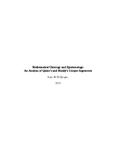| dc.rights.license | In Copyright | en_US |
| dc.creator | Quigley, Luke B. | |
| dc.date.accessioned | 2016-07-27T14:56:49Z | |
| dc.date.available | 2016-07-27T14:56:49Z | |
| dc.date.created | 2016 | |
| dc.identifier | WLURG38_Quigley_PHIL_2016 | |
| dc.identifier.uri | http://hdl.handle.net/11021/33569 | |
| dc.description | Thesis; [FULL-TEXT FREELY AVAILABLE ONLINE] | en_US |
| dc.description | Luke B. Quigley is a member of the Class of 2016 of Washington and Lee University. | en_US |
| dc.description.abstract | This thesis is concerned with the existence and knowledge of mathematical objects within a naturalistic philosophy. I will begin with a brief explanation of what constitutes a mathematical object and will then define and briefly analyze the two most extreme arguments for their existence, pure Platonism and pure concretism, using Plato's and Mill's views, respectively. I will then explain the difficulties for any argument of this type that arises with Benacerraf's dilemma: that any argument regarding mathematical ontology and epistemology must provide a plausible account for both mathematical truth and knowledge in a way that does not differ from our accounts for truth and knowledge of anything else.
I will then consider the Quine-Putnam Indispensability Argument, which provides arguably the best known answer to Benacerraf, beginning first with an explanation of Quine's empirical holism and resulting scientific naturalism, which is key to understanding his overall argument. This will follow with an outline of fundamental objections by Penelope Maddy that stem from differences between her and Quine's naturalism.
I will then review areas of general concern for naturalistic philosophy and how both Maddy and Quine overcome them. I will follow with an attempt to individually respond to Maddy's objections of Quine's Indispensability Argument using the foundations of his empiricism and naturalism, arguing that Maddy's counter-examples are times when either scientists were wrong or they demonstrated a need to further constrict what constitutes our best scientific theories. I shall also discuss how the differences in mathematical and scientific goals should not concern our philosophical inquiries.
Given that we have good reason to have ontological commitment to sets, I will review Maddy's set theoretic realism and her modifications of Benacerraf's definition of knowledge, and I will highlight areas of concern and inconsistencies in her argument. Lastly, I will discuss any final consequences of these arguments, as well as any open questions. [From Introduction] | en_US |
| dc.description.statementofresponsibility | Luke B. D. Quigley | |
| dc.format.extent | 51 pages | en_US |
| dc.language.iso | en_US | en_US |
| dc.rights | This material is made available for use in research, teaching, and private study, pursuant to U.S. Copyright law. The user assumes full responsibility for any use of the materials, including but not limited to, infringement of copyright and publication rights of reproduced materials. Any materials used should be fully credited with the source. | en_US |
| dc.rights.uri | http://rightsstatements.org/vocab/InC/1.0/ | en_US |
| dc.subject.other | Washington and Lee University -- Honors in Philosophy | en_US |
| dc.title | Mathematical Ontology and Epistemology: An Analysis of Quine's and Maddy's Unique Arguments (thesis) | en_US |
| dc.type | Text | en_US |
| dcterms.isPartOf | RG38 - Student Papers | |
| dc.rights.holder | Quigley, Luke B. | |
| dc.subject.fast | Benacerraf, Baruj, 1920-2011 | en_US |
| dc.subject.fast | Quine, W. V. (Willard Van Orman) | en_US |
| dc.subject.fast | Analysis (Philosophy) | en_US |
| dc.subject.fast | Knowledge, Theory of | en_US |
| local.department | Philosophy | en_US |
| local.scholarshiptype | Honors Thesis | en_US |
